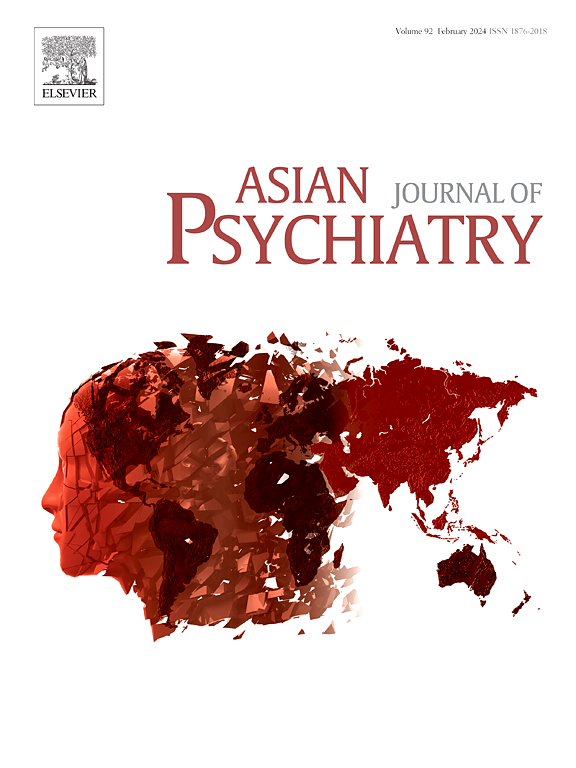健忘轻度认知障碍患者海马分区域网络异常与情景记忆衰退相关
IF 4.5
4区 医学
Q1 PSYCHIATRY
引用次数: 0
摘要
国内轻度认知障碍(aMCI)的特点是情景记忆明显下降。海马体对情景记忆至关重要,其子区域内的信息整合对这一过程至关重要。本研究探讨了aMCI患者海马次区域网络的改变与情景记忆障碍的关系。方法在2021年3月至2022年5月期间招募aMCI患者(n = 32),与年龄、性别和受教育年限相匹配的认知正常对照组(n = 32)。情景记忆采用韦氏记忆量表的逻辑记忆子测试进行评估。静息状态功能MRI数据采集。构建海马次区域网络来表征aMCI的功能连通性和拓扑改变。使用Pearson相关分析来评估网络指标与情景记忆功能之间的关系。我们发现aMCI中海马亚区网络的整合受损,这反映在路径长度增加和整体效率降低上(p <; 0.05)。较长的路径长度与较低的逻辑记忆得分相关。双侧副带与左侧齿状回颗粒和分子层之间以及右侧副带与左侧CA1之间的功能连通性下降(连接水平阈值p <; 0.001,网络水平阈值pFDR <; 0.05)。节点分析显示双侧耻骨旁和耻骨下前的中心性和节点效率降低(pFDR < 0.05),两者都与aMCI的情景记忆呈正相关(pFDR < 0.05)。结论aMCI患者的情景记忆障碍与海马次区域整合改变有关,而副耻骨和下耻骨前是潜在的关键区域。本文章由计算机程序翻译,如有差异,请以英文原文为准。
Aberrant hippocampal subregional network associated with episodic memory decline in amnestic mild cognitive impairment
Background
Amnestic mild cognitive impairment (aMCI) is characterized by marked episodic memory decline. The hippocampus is essential for episodic memory, and integration of information within its subregions is central to this process. This study examined how alterations in hippocampal subregional network relate to episodic memory impairment in aMCI.
Methods
Participants with aMCI (n = 32) were recruited between March 2021 and May 2022, with cognitively normal controls (n = 32) matched for age, sex, and years of education. Episodic memory was evaluated using the Logical Memory subtest of the Wechsler Memory Scale–Revised. Resting-state functional MRI data were acquired. Hippocampal subregional networks were constructed to characterize functional connectivity and topological alterations in aMCI. Pearson correlation analyses were used to assess the relationships between network metrics and episodic memory function.
Results
We found impaired integration of the hippocampal subregion network in aMCI, as reflected by increased path length and decreased global efficiency (p < 0.05). Longer path length correlated with lower Logical Memory scores. Functional connectivity decreased between the bilateral parasubiculum and the left granule and molecular layer of the dentate gyrus and between the right parasubiculum and left CA1 (connection-level threshold p < 0.001, network-level threshold pFDR < 0.05). Nodal analyses revealed reduced degree centrality and nodal efficiency in the bilateral parasubiculum and presubiculum (pFDR < 0.05), both positively associated with episodic memory in aMCI (pFDR < 0.05).
Conclusions
These findings suggest that episodic memory impairment in aMCI is linked to altered hippocampal subregional integration, with the parasubiculum and presubiculum as potential key regions.
求助全文
通过发布文献求助,成功后即可免费获取论文全文。
去求助
来源期刊

Asian journal of psychiatry
Medicine-Psychiatry and Mental Health
CiteScore
12.70
自引率
5.30%
发文量
297
审稿时长
35 days
期刊介绍:
The Asian Journal of Psychiatry serves as a comprehensive resource for psychiatrists, mental health clinicians, neurologists, physicians, mental health students, and policymakers. Its goal is to facilitate the exchange of research findings and clinical practices between Asia and the global community. The journal focuses on psychiatric research relevant to Asia, covering preclinical, clinical, service system, and policy development topics. It also highlights the socio-cultural diversity of the region in relation to mental health.
 求助内容:
求助内容: 应助结果提醒方式:
应助结果提醒方式:


